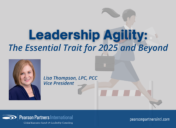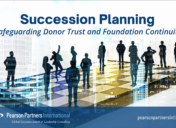A Critical Leadership Skill: Avoiding “Task-Toggling”
A Critical Leadership Skill” Avoiding “Task-Toggling”
Lisa Thompson, Managing Director, Professional Services
 One of the hardest tasks for any senior executive is staying focused on the task at hand. There are distractions everywhere: phone calls, emails, texts, internal squabbles and external crises that often demand immediate attention. In a fast-paced workplace, multitasking is part of our daily lives.
One of the hardest tasks for any senior executive is staying focused on the task at hand. There are distractions everywhere: phone calls, emails, texts, internal squabbles and external crises that often demand immediate attention. In a fast-paced workplace, multitasking is part of our daily lives.
But new research by Carnegie
Mellon University’s Human-Computer Interaction Lab, in conjunction with the New York Times, points to the detrimental effects that multitasking interruptions have on our brains. Subjects who were interrupted while performing a mental task answered questions correctly up to 20 percent less often than a control group did—a substantial decline in mental performance.
Other research shows that when someone tries to do two things at once, both tasks suffer. Though we may be unaware of it consciously, our brains actually have to “toggle” between one task and another. So if you are answering an email, your brain is in an analytical mode while your fingers are typing away. If you’re trying to listen to a speaker make a presentation at the same time, you have to switch gears mentally, or you’ll miss the gist of the speaker’s message. It’s the same principle behind “distracted-driving” legislation that imposes penalties for texting or talking on a mobile phone when behind the wheel. Studies have shown that texting while driving—even when dictating texts—is even more detrimental to driver reaction time than driving while drunk.
One of the interesting findings of the Carnegie Mellon study was that being aware of the prospect of an interruption—even if that interruption never comes—may actually improve performance. Subjects who were told they might be interrupted, but weren’t, outperformed the control subjects in the study, leading researchers to speculate that to steel themselves against the possible interruption, the subjects focused more intently on accomplishing the task at hand. This supports the value of having a “closed-door” policy in the C-suite, at least for part of the day, which gives executives time to focus while knowing that interruptions may be inevitable. It also points to the invaluable role of an executive assistant as a gatekeeper who screens incoming messages and interruptions.
Here are some other suggestions for fending off interruptions and avoiding the mental disruptions caused by toggling from task to task:
- Set daily priorities before starting the workday.
- Designate 30-minute or one-hour “do-not-disturb” periods for focusing on a specific priority or task.
- Schedule one or two “downtime” periods, such as before lunch or late in the afternoon, to return calls, answer emails and handle non-priority matters.
- Keep a clean desktop. Reducing the amount of clutter on your desk and the number of open windows on your computer screen makes it easier to stick with one task at a time.
To succeed in achieving your short-term and long-term career objectives, it’s imperative to stay focused on your priorities and eliminate as many distractions as possible. Learning to avoid task-toggling is a step in the right direction.














